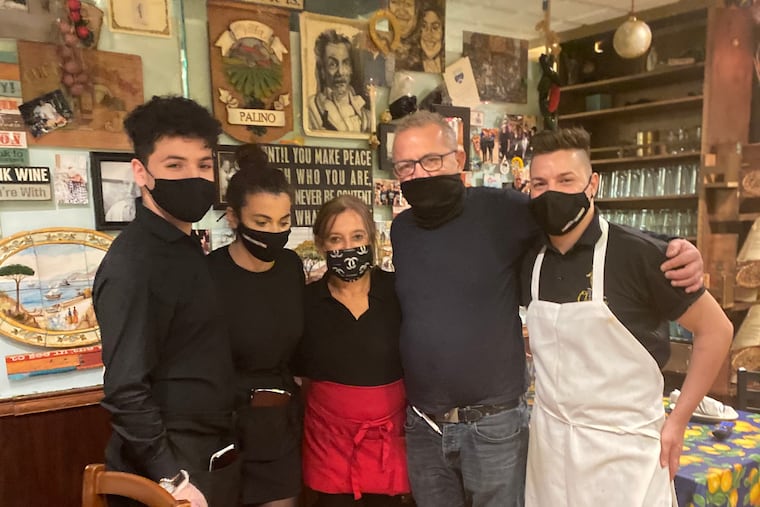Gov. Wolf’s COVID-19 restrictions will decimate small businesses across the state | Opinion
Even before Wolf’s announcement, when parts of the economy were coming back to life, the Bureau of Labor Statistics found that jobs in accommodation and food service were down 25%.

At Vecchia Osteria in Newtown, Bucks County, oversized Christmas balls hang from the ceiling and lighted garland frames each entry way. Dozens of tables sit empty, waiting for customers who won’t be coming. The only signs that the business is still open are three large, brown takeout bags under a framed portrait of actress Sophia Loren.
Owners Pasquale and Anna Palino and their young children immigrated to this country from Italy in 1999. After a decade working the kitchens of Italian restaurants around Philadelphia, Pasquale opened Vecchia. Today, all five children, along with their two sons-in-law, work the business seven days a week. Earlier this year, they managed to survive the first round of Gov. Tom Wolf’s COVID-19 lockdowns. But the governor’s latest litany of restrictions — including a three-week indoor dining ban during the industry’s busiest time of year — threatens to destroy the American dream they spent a lifetime building.
“We are losing money every single day,” says Anna, a breast cancer survivor. The eatery, she points out, has lost not only regular, dine-in customers, but also income from holiday parties, catering, and gift-cards sales that make the holiday season especially important for restaurants. The Palinos want to stop the virus from spreading, and say they follow every health rule. But they, like many, believe it is individuals taking personal responsibility, not government mandates, that will be required to stop the spread.
Pasquale and Anna have 30 employees who rely on them to earn a living. That’s why their family decided to keep paying all their employees and not to take any income for themselves. But they wonder how long that can last.
» READ MORE: COVID-19 relief should extend CARES Act work-sharing provisions | Opinion
The Palinos aren’t alone. Wolf’s strident measures, enacted amid rising COVID-19 cases and set to last through Jan. 4, will have a devastating effect on small businesses that support Pennsylvania’s communities. And yet, there are scant data linking restaurants and other indoor businesses — already following health guidelines — to the spread of the coronavirus. Despite numerous requests for data, the administration still hasn’t offered proof that these measures work.
In the meantime, the perpetual threat — then abrupt enforcement — of so-called temporary restrictions has a destructive effect on small businesses and risks permanently damaging our state’s economy. Wolf, though, dismissed any blame when asked about the thousands of community businesses on the verge of permanent closure (his previous COVID-19 orders, moreover, were ruled unconstitutional by a federal judge in September). “It’s not the government putting businesses at risk, it’s the virus,” he said at a news conference.
Wolf has failed to acknowledge that most business owners are complying with safety regulations. Despite this, his latest shutdown order will seriously damage Pennsylvania’s service economy, which tends to employ lower-paid workers. This sector’s base, especially this time of year, can’t endure prolonged periods of unemployment. Even before Wolf’s announcement, when parts of the economy were coming back to life, the Bureau of Labor Statistics found that jobs in accommodation and food service were down 25%.
For Wolf, the answer to this problem lies solely in funding. Too many government leaders, though, fail to recognize that even the lowest-paid workers find more than money in their work. Since 2005, an increasing number of people at every income level have reported the need to find meaningful employment.
» READ MORE: Some Pennsylvania restaurants say they will defy indoor-dining ban, trade group says
Business owners have every incentive to limit the spread of the virus. And they rightly question why, without supporting data, they are having their livelihoods ripped out from under them — especially as the majority of deaths are centered in nursing homes.
Pasquale says that he still believes in America and that his family will find a way to go on. “I tell my wife, I tell her that maybe we gonna fail — sometimes we fail,” Pasquale says. “But in America, you can fail forward.” Gov. Wolf’s heavy-handedness is preventing thousands of workers from doing just that. His actions are costing people both money and meaning in a season already filled with loss.
Jennifer Stefano is the chief innovation officer and vice president at the Commonwealth Foundation.